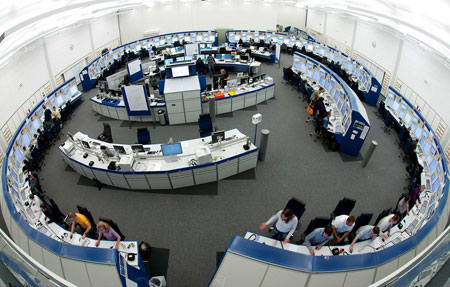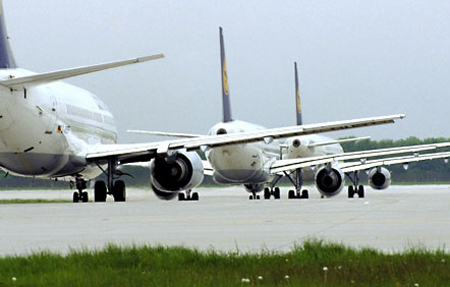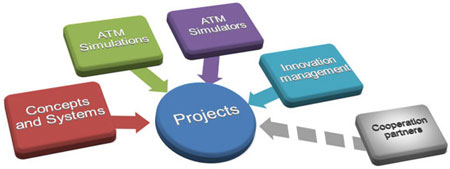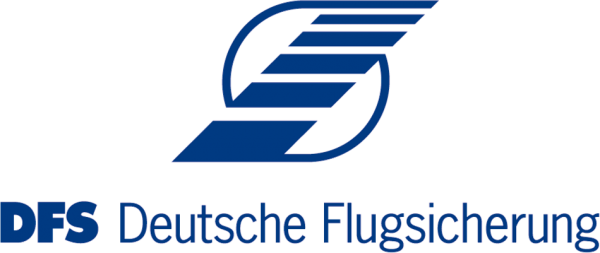DFS Deutsche Flugsicherung GmbH
Air Traffic Management Consultancy and Solutions
DFS Deutsche Flugsicherung GmbH is responsible for Air Traffic Management Solutions in Germany and is headquartered in the town of Langen close to Frankfurt. It is a company organised under private law and 100% owned by the Federal Republic of Germany. Founded in 1993, DFS is the successor to the Federal Administration of Air Navigation Services (BFS), a government authority. The German Constitution and the German Aviation Act (LuftVG) had to be amended by the Bundestag to make this possible.
In Germany, military and civil air traffic controllers work side by side. Since 1994, DFS has been responsible for the handling of both civil and military air traffic in peacetime. Only military aerodromes are exempted from this integration.
Throughout Germany, DFS is represented at 16 international airports, and at nine regional airports by its subsidiary DFS Aviation Services GmbH. Controlling air traffic from the towers and control centres is the core business of the German air navigation service provider.
DFS areas of activity
Controlling air traffic from the towers and control centres is the core business of the German air navigation service provider. Apart from performing day-to-day activities, DFS compiles flight-related data and uses them in its products and services, such as aeronautical charts, pre-flight information and the development of air traffic management systems, surveillance systems as well as navigation aids. At its Academy, DFS trains a large number of new air traffic controllers every year. In addition, DFS shares its know-how with other companies by providing consultancy services.
Company Profile
-
DFS has the following areas of activity:
Control Centre and Tower
Control room or tower cab: Some air traffic controllers work in the tower cab at the airport, while others work in the control centre and use radar to control air traffic. They all have the same task, regardless of where they work: All aircraft have to reach their destinations safely and efficiently, both on the ground and in the air. In performing this task, controllers work in a team and use highly sophisticated technology.
Air traffic controllers perform a highly responsible job, and a high level of trust is placed in them. Uninterrupted monitoring of the airspace is essential – otherwise no aircraft could fly, take off or land safely. “Safety first” is the top priority in air traffic control.
The airspace over Germany is divided horizontally and vertically into different sectors. A team of two controllers is responsible for each sectors. They assign routes, flight levels and speeds to all aircraft crossing this area. If an aircraft leaves the prescribed course, the controllers will give the pilots instructions via radio to get back on track.
All instructions are given in English only. The controller and pilot work closely together: The pilot flies the aircraft, while the air traffic controller gives him directions. The controllers need to be highly skilled to separate the aircraft in such a way that the prescribed separation minima are complied with. They are constantly bombarded with new information, which they must integrated in their workflows. At the same time, they have to coordinate with the air traffic controllers working in the adjacent sectors.
Because controllers cannot go it alone – the job of controlling the airspace can only be done as part of a team. This is why the controller is assisted by another colleague and uses highly specialised radar and computer systems. Air traffic controllers must be proficient in operating the technical systems and communicating quickly and clearly.

-
Safety
Flying is the safest way to travel, because it has the lowest number of accidents per passenger-kilometre of all means of transport. This is not to say that mistakes do not happen in air traffic. However, wrong decisions are systematically recorded and analysed to prevent similar mistakes from happening in the future. Safety is also our top priority at DFS.
Passengers boarding an aircraft at a German airport have no cause for concern. The fact that flying is safe not only in Germany but throughout Europe is reflected by the statistics compiled by the International Air Transport Association (IATA). These put Europe among the safest regions in terms of air traffic. It is largely at the discretion of a car driver to decide whether to drive quickly or slowly, whether to tailgate or leave enough space between his car and the car in front. Air traffic, however, is another story. All flights under instrument flight rules are controlled by air traffic controllers. Whether during take-off, landing or overflight – the DFS controllers ensure that all aircraft in German airspace keep sufficient distance from each other. The minimum vertical separation between two aircraft has to be at least 1,000 ft (approximately 300 metres), while the prescribed horizontal separation is between three and eight nautical miles (5.6 to 14.8 kilometres). When aircraft on approach-to-land are being guided into the airport by the controller like pearls on a string, the minimum separation is three nautical miles. Some airports still apply two or two-and-a-half miles (3.7/4.6 kilometres), depending on the certified procedure.
There are rarely any consequences if a car driver gets too close to the car in front of him, unless he is caught by the police or the driver in front brakes suddenly. But there are consequences in air traffic. Every infringement of the separation minima in the air and every potentially dangerous situation on the ground is recorded and analysed. It is the task of the safety management system of DFS to conduct an analysis.

-
Environment
Flying is now part of our everyday life. At the drop of a hat we fly on business, on weekend breaks and to the other end of the world. Over the last four decades, air traffic has increased fourfold and is projected to continue rising. Thanks to air transport, we are more mobile than ever before. This rising trend has also been reflected in the rise of air cargo, with air transport making a significant contribution to the global economy. Germany is the country with the highest traffic volume in Europe. There are around 10,000 aircraft movements every day, making about three million every year. DFS has been tasked with ensuring that all these aircraft are all guided safely and expeditiously. Aviation does have its drawbacks, however: While it is true that only two percent of global emissions of CO2 are due to aviation, this figure can still be improved on. Society’s awareness of the need to protect the environment is rising – and this applies to aviation as well. DFS is aware of its responsibility and is making its contribution to acting in a climate-friendly and environmental manner.
Inquiries about aircraft noise
If you have any questions about flight routes or procedures that are related to a certain noise event, feel free to write us an e-mail.
-
Research & Development
We aim to develop and test innovations to make DFS and the overall air transport system fit for the future, both on a national and international level.
With this goal in mind, software developers, engineers, scientists, psychologists and air traffic controllers all work together in the following key areas:
- Concepts and systems (developing and assessing new concepts, procedures or technical components of a future air traffic management system)
- ATM simulations (conceiving, conducting and assessing ATM simulations)
- ATM simulators (conceiving, developing and maintaining ATM simulators)
- Innovation management (finding, planning and steering potential innovations at DFS)
The findings, skills and experience gained in these key areas are transferred into the world of practice by means of matrix projects, where they deliver significant added value, in particular, due to our interdisciplinary cooperation. Our collaboration with external partners also contributes to our success:
References, networks, partners and customers
Our references include customers within DFS as well as external customers. The list below will give you an overview of some of them:Research projects:
- International projects funded by the EU, EUROCONTROL projects, SESAR projects
- National projects (especially the aeronautical research programmes funded by the German federal government and the Länder (federal states)
- Internal DFS projects

Images
Contact
Aeronautical Solutions
Am DFS-Campus 10
Langen
Germany
D-63225
- +49 (0)6103 707-2051

